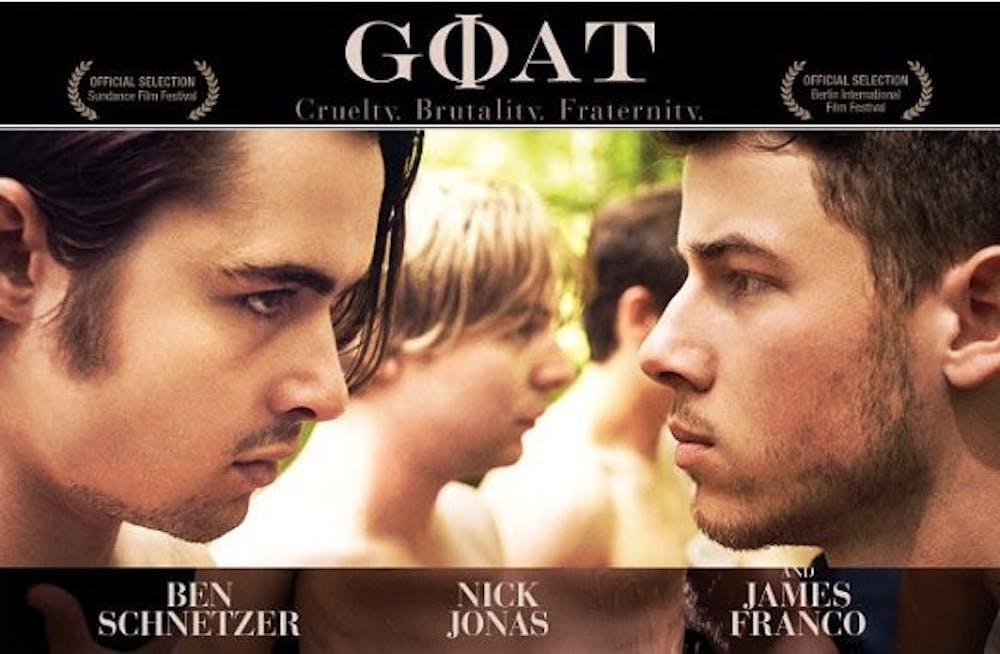"That movie with Nick Jonas about hazing," or Goat, highlights the modern pressure to be masculine through the lens of fraternity brothers and hazing. Goat follows Brad (Ben Schnetzer), a college freshman, who pledges a fraternity to follow in the footsteps of his older brother, Brett (Nick Jonas). Brad is subsequently hazed by Brett and other members of his fraternity. Brad’s situation is complicated, however, by the assault he experienced the summer before his freshman year.
Though the hazing in Goat is certainly not the worst that many college students have heard of or experienced, the filming leaves little to the imagination. Pledge tasks include being locked in a cage, peed on and crawling around naked. The fraternity that Brad pledges, Phi Sigma Mu, has an obsession with goats, perhaps because of the word’s use as an acronym for “Greatest Of All Time” frequently used in many fraternities. The brothers call every pledge a goat and, at one point, purchase a goat and threaten to make the pledges have sex with it. Brett fights against treating his scarred brother differently, while his fraternity brothers disapprove every time he slips up and helps his real brother out. Goat exposes this choice between humane treatment of his brother and obeying his Greek brothers. In doing so, the movie both condemns hazing and condemns the harsh expectation that protective brotherly instincts should be suppressed.
Throughout all this hazing, Brad is struggling with the aftermath of the assault during the summer. He seems to be trying to answer, both to Brett and himself, why he did not defend himself. Through this profile of Brad’s psyche, Goat is not just a commentary on fraternity hazing, but a commentary on standards of masculinity in general. Director Andrew Neel focuses much of the movie on Brad’s personal struggle with feeling inadequate. Intimate scenes of Brad switching from glasses to contacts and analyzing his wounds from his attack make it clear that Brad is torn apart by his need to feel manly. He needs to prove himself as a man to himself and to his brother, and hazing provides him with a way to do so.
It is crucial to consider this movie in the context of hazing culture on Penn’s campus. While fraternities and the hazing associated with them are often vilified, Goat raises the possibility that the rape culture and demeaning tasks are not a by product of fraternities but of masculinity standards. Issues with fraternities that have faced Penn’s campus are perhaps less about fraternities themselves and more about Penn students reacting to the pressure to be manly.
Jonas’ performance was charming, as Jonas himself is. Despite his muscular arms and errant behavior, he is still the little Jonas Brother he once was, and therefore slightly unconvincing as a menacing frat brother. He does, however, play the tenderness of an older brother quite convincingly in his scenes with Schnetzer. Schnetzer and his longish hair appear truthfully reflective and introverted in his role as the insecure Brett.
While Goat is sickening to watch, it seems the film's graphic nature was a conscious choice in order to make a point about the pressures of masculinity. Starting from its first scene, shirtless guys chanting and jumping around something we cannot see, Goat exposes fraternity culture’s raw honesty. Goat’s criticism, however, is less directed towards the Greek system as it is towards the hyper–masculine expectations and culture that make the system possible. The fraternity brothers are at once attacked by and perpetrators of masculine expectations, so they haze to resolve their insecurities.







